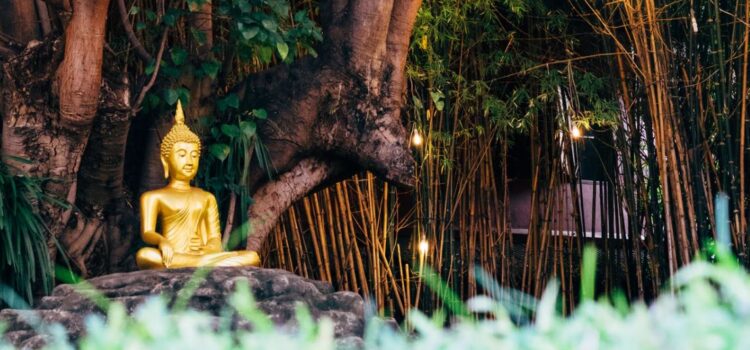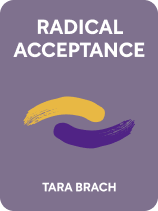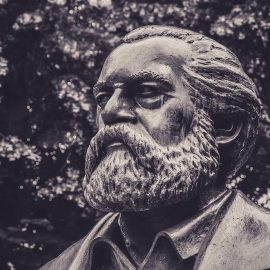

This article is an excerpt from the Shortform book guide to "Radical Acceptance" by Tara Brach. Shortform has the world's best summaries and analyses of books you should be reading.
Like this article? Sign up for a free trial here .
What does it mean to “go beyond self” in Buddhism? If we have no self, then how can we feel things like love and grief?
There is no “self” in Buddhism. Buddhism teaches that each being is part of a universal presence rather than an individual being. It can be very difficult for people, especially Westerners, to go beyond the self because we’re raised to believe that the self is all-important.
Continue reading to learn more about the “self”, Buddhism, and Radical Acceptance.
Finding Our True Nature
Radical Acceptance can help us finally see beyond the illusions and narratives that we build up around ourselves. There is no “self” in Buddhism. Buddhism teaches that each of us is part of a universal presence of awareness and love, rather than an individual entity. We’re born from that universal presence, and we return to it when we die.
Radical Acceptance is the practice of welcoming each experience as it comes, and remaining unaffected—however, it’s also the first step toward recognizing that the reason we’re unaffected is because there’s no “us” to be affected. We’re beings of awareness and love—not ego.
Doubting Our Goodness
There will be times when we doubt that we really have Buddha nature—times when we feel angry, judgmental, unfocused, or self-conscious. At times like these, it’s helpful to remember the story of Siddhartha under the Bodhi tree.
Mara, the god of delusion and hatred, was the final obstacle between Siddhartha and enlightenment. After all of Mara’s frightening illusions and vicious attacks failed, his final challenge was a simple question: What gave Siddhartha the right to claim Buddhahood? Who was he to pursue enlightenment? In other words, Siddhartha’s final challenge was overcoming doubt.
You may recall that Siddhartha’s response was to touch the earth and call upon it to bear witness to his many, many past lives of compassion and love. It wasn’t Siddhartha himself that finally drove Mara away, but the universal awareness that Siddhartha was a part of. This part of the story is crucial to understanding both Buddhism and our own nature—remember, in Buddhism there is no “self.”
Just as Siddhartha touched the ground to connect with that universal awareness, we can touch the ground by being completely present in the moment, by experiencing and accepting everything around and inside of us. This will help us to move beyond our illusions of “self” and reconnect with our Buddha nature.
Going Beyond the Self
We can bring this self-less awareness into our lives through Radical Acceptance and meditation. Radical Acceptance will free us from the immediate pain of our negative emotions, but we may find that there’s still a part of us whispering stories of unworthiness and doubt.
At such times, we can ask who it is that’s aware of these feelings, who’s telling those stories. Is there still a “self” that we’re trying to pull into, to protect? We can experience that “self” in various ways; even as we relax into meditation and Radical Acceptance, we may still view ourselves as “one who’s meditating” or “one who’s observing myself.”
However, the Buddha said that holding onto any sense of self, including the self who’s observing oneself, blocks us from reaching true awareness. By repeatedly asking who it is that’s aware, we can eventually find that it’s nobody. Doing so may require cutting through many layers of delusion and repeatedly asking ourselves who is feeling, who is observing.
This step may be especially difficult for those who grew up in Western countries, where the self is all-important. However, through long practice and meditation, we can turn our awareness inward and realize that there’s no presence trying to control our experiences, no thoughts or desires—there’s only awareness itself, stretching both inward and outward without limits.
Reaching this state requires letting go of all of our thoughts, emotions, desires, and stories. Those are all illusions that hide our truest, innermost self—or, rather, our lack of self.
We Are Beings of Emptiness and Love
The clearest view of this universal, impersonal awareness and love might come when we’re suffering grief. Simply put, our grief is the recognition that a life we cherished is gone, and that everything we love is temporary.
However, if we meet that grief with Radical Acceptance, we can hold it with compassion and love. If we ask ourselves who it is that’s suffering, we can see past the grieving self and connect to the universal source of awareness and love that we all came from. That source is deathless and unchanging. The one we’ve lost is still part of it as surely as we ourselves are.
The essence of Radical Acceptance is engaging with the world—welcoming and loving each moment as it happens—while also sitting comfortably with the formless, universal awareness from which life comes and to which it returns.
There will be times when we suffer fear, doubt, or shame—times when Mara appears, one might say. At those times, like the Buddha, we can touch the ground. We can take a pause, and bring Radical Acceptance to the present moment. In doing so, we’ll remember that we are beings of love. Our desire to awaken our own compassion can guide us through Mara’s illusions, no matter how frightening or all-consuming they might seem. However lost we become, we can always trust the universal, loving awareness that is our true nature—our Buddha nature. That is the heart of Radical Acceptance.

———End of Preview———
Like what you just read? Read the rest of the world's best book summary and analysis of Tara Brach's "Radical Acceptance" at Shortform .
Here's what you'll find in our full Radical Acceptance summary :
- How to live your life fully experiencing everything
- Why you need to let go of judging yourself or your experiences
- How you can acknowledge and welcome any experience






